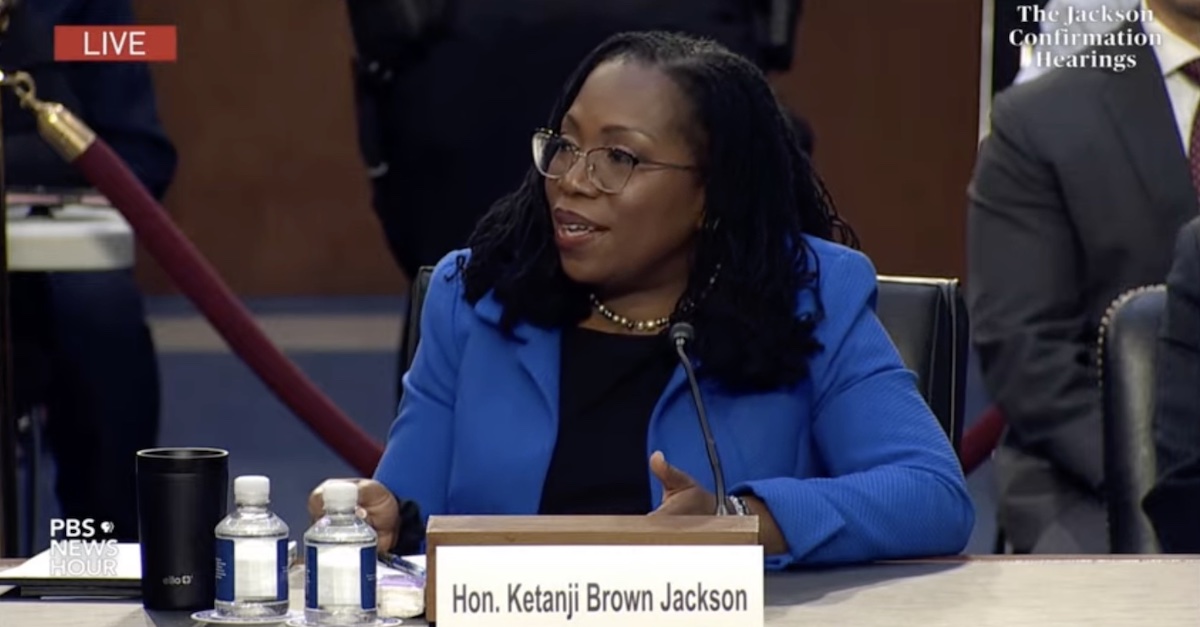
Judge Ketanji Brown Jackson (via screengrab)
Ketanji Brown Jackson has completed her historic ascent to the Supreme Court, earning enough votes to become the first Black woman to serve as a justice in America—with scant Republican support. She will be sworn in at the end of the high court’s term this summer when her mentor and soon-to-be predecessor, Stephen Breyer, is set to retire.
All Democratic officials voted for her confirmation, along with three Republican senators: Mitt Romney of Utah, Susan Collins of Maine, and Lisa Murkowski of Alaska.
Jackson’s pathway to the highest court in the United States was bitterly opposed by nation’s opposition party.
First appointed as a federal judge by Barack Obama in 2013, Jackson served as a district court judge in Washington, D.C. for some eight years. Then, Obama’s erstwhile vice president, Joe Biden, had higher plans for her early in office. Early in his presidency, Biden appointed Jackson to the U.S. Court of Appeals for the D.C. Circuit, where her nomination largely sailed through by a 53-44 vote.
Jackson encountered more turbulence in filling Breyer’s seat. Sen. Lindsey Graham (R-S.C.), who previously supported her D.C. Circuit nomination, furiously (and deceptively) denounced her as soft on child pornography offenders, a line of attack first popularized by Trump loyalist Sen. Josh Hawley (R-Mo.).
Former federal prosecutor Andrew McCarthy wrote in the conservative magazine National Review lambasting Hawley’s line of attack as “meritless to the point of demagoguery.”
The Senate Judiciary Committee, chaired by Dick Durbin (D-Ill.), was quick to say that Jackson’s sentences were in line with her peers, noting that other District of D.C. judges imposed below-guidelines sentences in these cases 80 percent of the time. For more than a decade, the U.S. Sentencing Commission has advised Congress to update the statutory guidelines on child pornography offenses, which were written before the age of the internet. Jackson sat as a vice chair of the commission between 2010 and 2014.
As the commission noted in 2012, the current guidelines for child pornography offenses often advise longer prison terms than for physically sexually abusing minors, leading to lopsided sentences. Jackson’s sentences in such cases are on par with those of her peers.
Along with her race and gender, Jackson brings another first to the Supreme Court as a former federal defender. Several GOP lawmakers, including Sen. Tom Cotton (R-Ark.), used her tenure as a defense attorney for accused terrorists in Guantánamo Bay against her.
Jackson defended her representation of those detainees as an expression of upholding U.S. ideals.
“For me, what that meant was an understanding that to defend our country and its values, we also needed to make sure that when we responded as a country to the terrible attacks on 9/11, we were upholding our constitutional values, that we weren’t allowing the terrorists to win by changing who we are,” Jackson said. “So I joined with many lawyers during that time who were helping the courts figure out the limits of executive authority consistent with what the framers have told us is important, the limitations on government. I worked to protect our country, my brother worked on the front lines and it was all because public service is important to us.”
A Harvard graduate ranked “well qualified” by the American Bar Association, Jackson’s supporters said that she had a resumé that would have won her backing across the aisle in a less partisan era. She boasts the backing of the Fraternal Order of Police and the International Association of Chiefs of Police, a fact used to refute Republican critiques about her toughness against criminal offenders. Her brother Ketajh Brown, served in the Army and as a police officer in Baltimore, Md.
Such credentials flew in the face of Jackson’s now-opponent Sen. Graham, who called her the choice of the “most radical elements of the Democratic party with the most radical views of how to be a judge.” Graham notably did not harbor that view when he supported Jackson’s D.C. Circuit bid last year.
The partisan rancor opposing her confirmation reached such a height that some Republicans walked out during the applause of her confirmation.
Notably, Romney remained.
(Screenshot of Jackson’s confirmation hearings)
Have a tip we should know? [email protected]